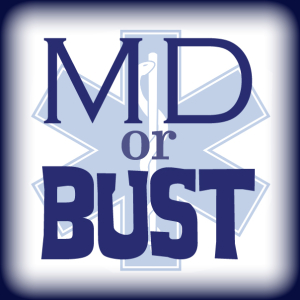“What’s the matter with everybody?” asked Mrs. Palmer, a hopelessly demented woman with water wells for eyes. She had just endured her third consecutive tongue-lashing by the bulldog masquerading as a nurse anesthetist. Her bewilderment only slightly exceeded my own; in a surgical suite on my first day of clinical rotations, I was mentally rehearsing how to scrub in without accumulating any (more) ire from the operating room staff.
That all seems so long ago now, sitting in a hotel lounge on my final stop of the residency interview trail. I had completely forgotten Mrs. Palmer until I began flipping backward through my journal to criticize my old writing and lament the downfall of my penmanship — from fluid scrawl to deranged hieroglyphics. I skimmed the indecipherable pages, succumbing to waves of nostalgia; once the nostalgia subsided, I realized that the notebook was a comprehensive record of my medical education. This raised a new question.
How could I measure that education?
Maybe my medical education can be measured in student loan debt, the size of which long ago passed the limits of my comprehension. Perhaps I could measure it by my exponentially increasing collection of gray hair (though still a minority, if the pace keeps up, I will go full Anderson Cooper by my mid-thirties).
At a minimum, the last four years should reflect the accumulation of medical confidence. I spent precisely one day celebrating my acceptance to medical school; every day since has been consumed by some degree of “impostor syndrome.” Surely the admissions committee had made some critical error — it was only a matter of time before medical school would expose me for substandard intelligence, misplaced ideals or any other of a litany of deficiencies. But maybe if I wore that short white coat and acted the part, I could convince people that I belonged. I might even convince myself.
But the coat, and whatever authority came with it, only sustained my insecurity. Patients divulged deep, personal secrets to it. Strangers acknowledged it with a smile and a “Hey, Doc!” in hospital corridors. One even paid for my lunch when I found myself wallet-less in a cafeteria line, dismissing my objections with, “You take care of others; let me take care of you.” Each was an undeserved courtesy, and I wanted nothing more than to yell back in a blaze of melodrama — I’m a fraud! My only bulwark against being debilitated by impostor syndrome were two short words of solidarity from classmates: “Me too.”
I returned to the notebook for answers. It held essays on pre-clinical lectures I barely remembered, short write-ups of bad first dates, and retrospectively painful jokes about Donald Trump. I found a bad poem about the cadaver lab, and a worse one written as an ode to ballpoint pens stolen by attendings. There were scores of patient vignettes and dozens of half-baked soapbox manifestos on medicine and humanism. Slowly, more than the handwriting began to give me trouble. I found the writing well-intentioned but often simplistic, naïve. At times, I barely recognized myself. The journal was a record of how I had changed over four years.
And there was the answer — it was my own transformation that measured my medical education. I’m more thoughtful now and more prepared to traffic in nuance and compromise. I’m more confident in front of patients and non-medical friends, and less confident among peers. I’m more focused and more practical. I’m also a little crankier, more impatient and more reclusive. I can, and have been, prickly and arrogant to family members, particularly when they engage me on medical issues.
I don’t know how to assess these changes — good, bad and ugly — or their aggregate. I’m still too close to the experience to make any credible judgments.
But perhaps such a judgment is unwise anyway. For each scribbled-in page of my journal, there are untold blanks waiting to be filled in with more of my own transformation in the coming years. My medical education remains incomplete, and as I proceed through graduation, residency, fellowship and whatever comes thereafter, I will continue to change, in ways that I cannot yet appreciate. Hopefully, that change will be for the better.
Numerous studies have documented that medical students lose empathy during clinical years, becoming jaded and pessimistic. This has been linked not only to diminished enjoyment of our work, but also to worse patient outcomes. My goal is to sustain the humanistic values that drive so many of us to medicine, so that, instead of being quelled by cynicism, our idealism can be refined by wisdom.






